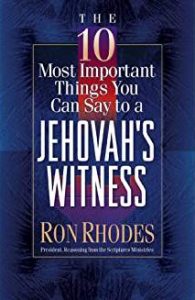This 128-page paperback was written to complement Rhodes’ 1993 book, Reasoning From the Scriptures With the Jehovah’s Witnesses, which I reviewed in an earlier blog article in this series.
It is doctrinal in focus and, in length, “short on purpose.” Organized into 10 primary points the reader should make to Witnesses, each chapter contrasts Watchtower errors with the biblical position and suggests a relatively small number of questions and points which the reader can present to Witnesses to challenge Watchtower teachings.
A final “Digging Deeper” paragraph ends each chapter by citing pages in Rhodes’ 1993 book where the reader can find more information.
According to Rhodes, the 10 most important things you need to get across to a Jehovah’s Witness are as follows:
- The Watchtower Society does not speak for God.
- The Watchtower’s New World Translation of the Bible is inaccurate and misleading.
- God has other names besides Jehovah.
- Jesus is God Almighty.
- The Holy Spirit is God, not a “force.”
- The God of the Bible is a Trinity.
- Salvation is by grace through faith, not by works.
- There is one people of God—not two peoples with different destinies.
- Man is conscious in the afterlife, and Hell is a real place of eternal suffering.
- Jesus changed my life forever.
As an example of the book’s content, Chapter 1 (“The Watchtower Society does not speak for God”) explains that the Watchtower claims to be God’s voice on earth and requires Witnesses to obey organizational directives without question. Witnesses are required to accept Watchtower Bible interpretations because reading the Bible alone will lead people astray. The ultimate penalty for disobedience is disfellowshipping (excommunication).
Rhodes sets out the biblical arguments the Watchtower asserts, including its claim to be the “faithful and discreet slave” of Matthew 24:45, the Bible’s exhortations to Christian unity, and the Ethiopian’s need for Philip to explain the Bible to him. He refutes each of these arguments and claims.
As a witnessing tip, the author recommends asking Jehovah’s Witnesses if God had no true representative on earth between the days of the apostles and the founding of the Watchtower organization in the 19th century. Does this mean he didn’t care if people understood the Bible during all those years? (p. 6)
Rhodes goes on to document Watchtower false prophecies and major doctrinal changes. He notes that we are to judge truth claims by the Bible, not the Bible by the pronouncements of an organization.
He concludes the chapter by giving its main points and referring the reader to corresponding pages in his earlier book. He gives the main points of Chapter 1 as follows:
The Watchtower Society Does Not Speak for God
- The Watchtower Society misinterprets Bible verses to support its authority.
- Unlike Bible prophets, the Watchtower has a history of false prophecies.
- The Watchtower has changed its position on important issues through the years.
- The Bible says to test all truth claims by Scripture alone.
Later chapters have a similar structure.
Strengths:
The 10 Most Important Things You Can Say to a Jehovah’s Witness is well organized and covers a lot of important ground in a concise manner. It can be an important resource for people who don’t have the time or inclination to work their way through much larger books such as Rhodes’ own 1993 volume.
Limitations:
One of the book’s drawbacks is that in order to get deeper information and witnessing tips you might need, you have to have Rhodes’ earlier 458-page book as well.
I don’t necessarily agree with the author’s list of 10 most important things to say to Jehovah’s Witnesses.
For example, his second point is that we must get across the fact that the New World Translation is inaccurate and misleading. I have seen Witnesses come to saving faith in Jesus without first addressing that issue at all.
His third point to get across is that God has other names besides Jehovah. Actually, I think one of his subpoints in that chapter is far more important to get across: “Salvation does not depend upon adherence to the name ‘Jehovah.’” (p. 29)
His tenth point is that we must give our personal testimony of how Jesus changed our life. I’m not saying that it’s wrong to do that, of course. But a lot of groundwork needs to be laid first. Otherwise, the Witnesses will simply conclude that you have been deceived by Satan based on subjective feelings and false teachings.
Even though I disagree with the importance some of the author’s points to our witnessing efforts, I still consider the book well worth reading. I would just urge you to evaluate his list rather than simply accepting it as authoritative.
Click to BUY on Amazon.com
This page contains associate links – as an Amazon Associate I earn a small percentage from qualifying purchases.
Your turn:
Do you agree with Rhodes’ list of top 10 things you need to get across to Witnesses? If not, what do you consider to have a higher priority?
Share your thoughts in the comments.


Leave a Reply
Be the First to Comment!